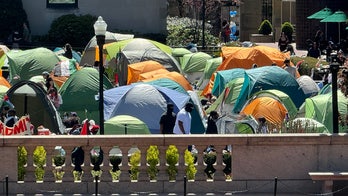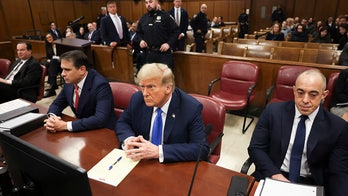TAMPA, Fla. -- Florida Gov. Charlie Crist defends his changing positions on issues by saying as a former college quarterback he knows how to call an audible. By the end of Sunday's debate with his opponents for U.S. Senate, it looked like he was throwing a Hail Mary.
The debate spun out of control near the end as independent Crist and Republican Marco Rubio rapidly talked over each other.
Crist, who is down by double digits in multiple polls with just more than a week left before the election, repeatedly interrupted Rubio with accusations that as House speaker he steered money to a university and a hospital and later took jobs from them. He also said Rubio doesn't advocate transparency because he won't release credit card records from his state GOP-issued American Express card.
"I've never had a heckler at the debate, I've always had them in the audience," Rubio said with a laugh.
"Welcome to the NFL," responded Crist.
It was clear that Crist and Democrat Kendrick Meek stepped up their efforts to make up ground against Rubio. Earlier in the debate, Meek, a congressman from Miami-Dade County, argued with Rubio about whether tax cuts passed under President George W. Bush should be extended.
The debate was sponsored by CNN, the University of South Florida and the St. Petersburg Times.
At one point, Crist jumped in after an exchange between Rubio and Meek on taxes, saying that the partisan bickering they displayed was why he's running as an independent.
Meek scoffed at the idea.
"We know why the governor is running as an independent -- because he couldn't beat Marco Rubio," said Meek.
Crist was a lifelong Republican until deciding at the last minute to run as an independent. He was badly trailing Rubio at the time.
"The reason I'm running as an independent is because it's what the people want and it's what's right with my own heart," Crist said, adding that Republicans went too far to the right for him.
"If your polling was higher than Marco Rubio's you would have left the party?" asked Adam Smith, the Times' political editor.
"Absolutely, because you have to be right with yourself, Adam. When the party has those kind of views and represents that kind of intolerance, that's not the way my parents, who are here today, raised me and my sisters. I couldn't live with that," said Crist, who criticized Rubio's opposition to abortion rights and stem cell research.
Meek and Rubio pointed out the governor's changing positions on issues. Crist said Florida wants a senator that can change positions as circumstances change.
"I remember calling a play in the huddle and literally as you're walking up to the line of scrimmage, you survey the defense, the facts and circumstances before you, see where the linebackers are, and realize that if there's going to be a blitz you've got to call an audible. You have to change to adapt the circumstances," Crist said.
Rubio said that's not why Crist has often switched positions.
"He changes position on the issues because he wants to win the election," Rubio said.
Crist shot back, "This is so untrue and so unfair for you to interpret what's in my heart."
For nearly half the debate, the candidates talked about whether the Bush tax cuts should be extended. Rubio and Crist think all the tax cuts should continue while Meek said that they should not continue for people making more than $250,000 a year.
Crist said he was willing to compromise his position, and Meek said he could agree to a higher income level, while Rubio said he wouldn't support any proposal that would let the tax cuts expire.
"Raising taxes on 30 percent of our consumer spenders or on the job creators that comprise 50 percent of small business taxes in America would be a disaster in the middle of this deep economic downturn," Rubio said.
But Meek said not taxing the super wealthy will cost the country $700 billion and without it, the national debt will continue to grow.
"Mr. Rubio and Mr. Crist start to stutter when we start talking about tax cuts for the super wealthy -- it's OK to borrow that money for it to happen," Meek said. "It's important that we save money, we bring the deficit down, but we don't borrow $700 billion."




